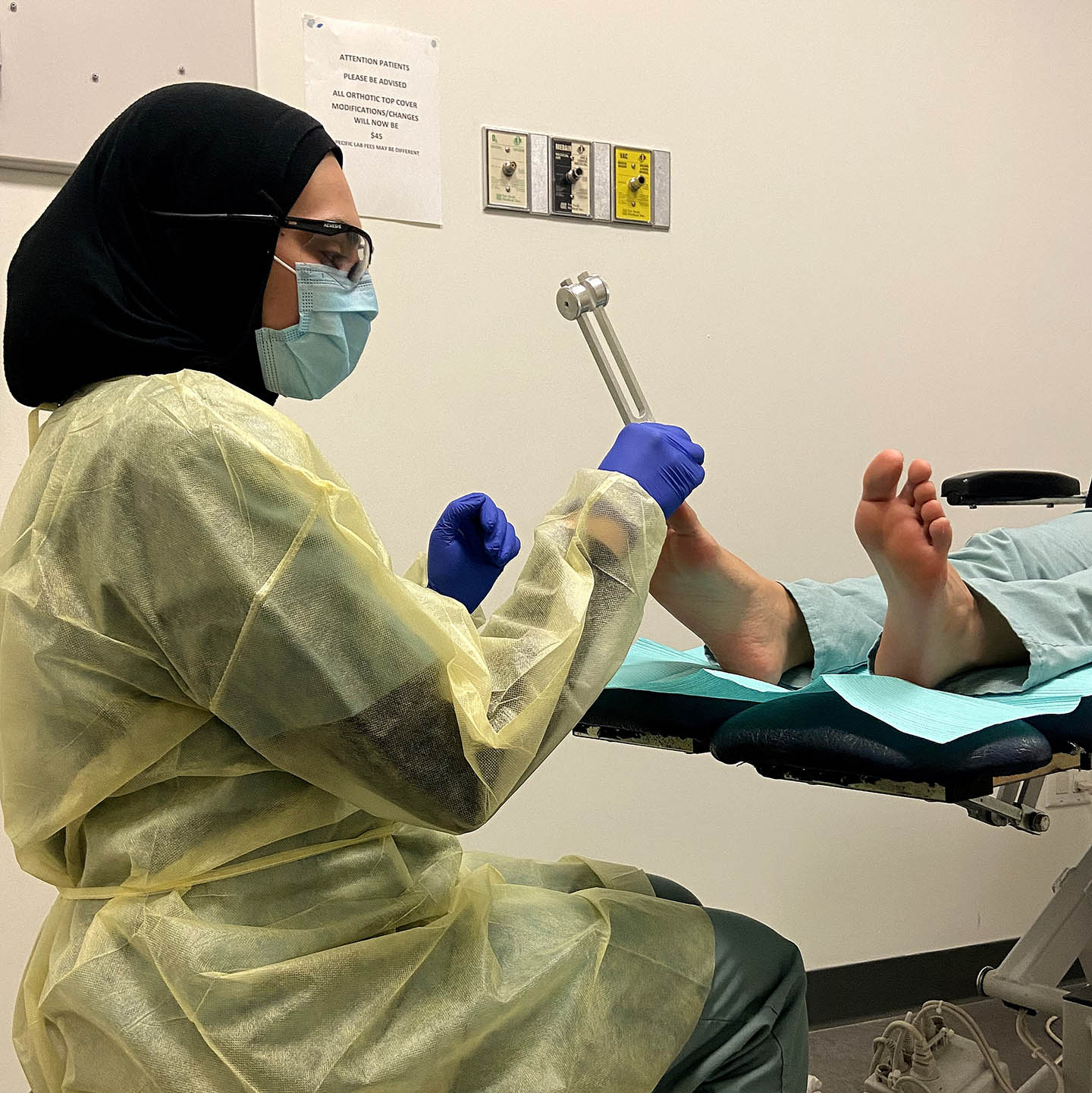Project Insights Report
Upskilling/Reskilling Canada’s Healthcare Workers
 Executive Summary
Executive Summary
The “Upskilling/Reskilling Canada’s Healthcare Workers” project in Toronto, Ontario, was designed to reduce the high rate of lower limb amputations caused by diabetes, particularly in marginalized communities. Notably, 85% of these amputations are preventable with early intervention. The initiative focused on enhancing the skills of underutilized healthcare personnel, including personal support workers and community health workers, to improve foot care competencies and patient outcomes.
The project incorporated employers’ insights into diabetes foot care qualifications, tailored educational pathways to meet clinician needs, and offered culturally sensitive training for Indigenous populations. This comprehensive approach included curriculum development, training, and evaluation, with a collaborative design process to modify the curriculum according to stakeholder feedback.
Overall, the program trained 114 healthcare workers across three provinces and territories, including 33 personal support workers and 13 community health workers. The Northwest Territories Health Authority and the Advanced Foot Care Nurses Association in Newfoundland adopted the training modules, demonstrating a broad impact. Furthermore, collaboration with the Indigenous Diabetes Health Circle facilitated culturally tailored training for 21 individuals in Northern communities, benefiting an additional 30 community members through foot screenings.
The project’s outcomes highlighted the necessity for adaptable training programs, stronger community involvement, and systemic changes in healthcare practices. It revealed substantial knowledge gaps in foot care among healthcare professionals and emphasized the need for cultural competency. Looking ahead, the project aims to broaden public education on foot health, develop more comprehensive training, enhance intersectoral cooperation, and secure additional funding to expand its influence, especially in remote and Indigenous areas.
Key Insights
After completing the training, 76% of participants reported improved skills in identifying and managing diabetic foot complications.
The Northwest Territories Health Authority’s implementation of foot screening kits and the Best Foot Forward modules demonstrated the project’s potential to influence healthcare practices regionally.
Participants preferred in-person training, facilitating more effective learning and skill development.The Advanced Foot Care Nurses Association in Newfoundland utilized a “Train the Trainer” approach, enhancing the training’s reach and ensuring more providers could screen for diabetic foot issues.
 The Issue
The Issue
In Canada, the healthcare system faces a critical challenge with the high incidence of preventable lower limb amputations, primarily due to complications from diabetes. This issue is particularly acute among marginalized populations, including Indigenous and racialized Canadians, who experience higher rates of diabetes and subsequent complications. The statistics are alarming: a person with diabetes in Canada has a 15% to 25% risk of developing a foot ulcer in their lifetime, and once that develops, the likelihood of requiring an amputation within the next two to five years exceeds 75%. Furthermore, approximately 85% of these amputations are preventable with early intervention and proper foot care.
Historically, the approach to managing diabetic foot complications has been reactive rather than proactive, focusing on treating the condition after it has advanced to a critical stage. This has not only led to significant healthcare costs, Ontario spends approximately $500 million annually on lower limb amputations, but also to profound personal impacts on patients, including reduced mobility, quality of life, and life expectancy. Indigenous persons with diabetes face a rate of lower limb amputation that is three times higher than the national average, highlighting a significant disparity in health outcomes.
Efforts to address this issue have been hampered by a shortage of specialized healthcare providers, such as chiropodists and podiatrists, particularly in rural and Northern areas. Previous initiatives have often been limited in scope and have not adequately addressed the need for widespread education and training among healthcare workers who could potentially screen for and manage diabetic foot complications more effectively.
This gap in the healthcare delivery system has underscored the need for a more integrated and proactive approach to diabetic foot care, emphasizing the importance of upskilling and reskilling healthcare workers to prevent the progression of foot ulcers to amputation.

 What We Investigated
What We Investigated
Our investigation focused on the effectiveness of upskilling and reskilling healthcare workers in Canada, specifically those involved in diabetic foot care. The project aimed to develop and evaluate a skills training model to improve care for high-risk foot wounds and prevent limb loss.
Key stakeholders in this project included The Michener Institute of Education at UHN, the University Health Network, and various community partners such as:
- Indigenous Diabetes Health Circle
- Northwest Territories Health Authority Newfoundland
- Association of Advanced Foot Care Nurses
- Parkdale Queen West Community Health Centre (Community-based health service organization)
- University Health Network Social Medicine Department (first-of-its-kind-in-Canada Social Medicine Supportive Housing Provider in Parkdale, Toronto.)
- Dixon Hall (Emergency shelters)
- Streethaven (Women’s shelter)
- Niagara Health Medical Group (Family Health Team)
The investigation was structured into multiple phases: stakeholder engagement, competency gap analysis, curriculum co-design, pilot testing of the education pathway, and detailed program management.
We explored several research questions:
How can we integrate employer perspectives into developing credentials for diabetes foot care?
What educational pathways align with clinician-driven pathways and future employer needs? How can we create sustainable foot care pathways that meet current best standards and educational requirements at the practitioner and team levels?
The approach was to partner with community organizations that work with underserved populations in Canada to co-adapt a foot health education curriculum that reflects the needs of each organization. The foot health education curriculum includes six core modules, which provide information on foot care, how to assess for signs of foot health issues and how to conduct a foot assessment, as well as other information related to basic first aid. Each community partner will be able to own and use the co-adapted foot health education curriculum beyond the scope of this project to support upskilling of staff and community members
Throughout the project, we conducted numerous qualitative interviews with participants from different organizations and held several training sessions to test the newly developed curricula. The methodology combined qualitative interviews, document reviews, and direct training sessions.This approach ensured that educational materials were co-designed with stakeholders to be culturally appropriate and relevant to the specific needs of the communities served.
 What We’re Learning
What We’re Learning
This initiative was part of a larger effort to improve healthcare for people with diabetes by training non-specialist healthcare workers to identify and manage foot health issues effectively. During the project, 114 individuals from various job backgrounds across three provinces and territories received training in foot screening.
A key success was adapting and implementing the Best Foot Forward training modules. Originally online, these were changed to in-person sessions based on feedback from community partners who preferred this method. This change enhanced learning and allowed for immediate practice of the skills, which is especially beneficial in remote areas with limited access to specialized services.
The project significantly benefited from partnerships with community organizations, crucial for reaching underserved populations and demonstrated the valuable role of unregulated healthcare providers, especially in community settings. Training them to conduct foot screenings and make referrals supports a more integrated healthcare approach, crucial for managing complex conditions like diabetes. Training provided by the Indigenous Diabetes Health Circle (IDHC) not only equipped participants with essential skills but also promoted an understanding of culturally appropriate care, enhancing healthcare interactions with Indigenous communities.
However, challenges arose, particularly with the timing of activities and engaging partners. Securing agreements and coordinating sessions took longer than expected, affecting the project timeline. The COVID-19 pandemic also added complications, requiring adjustments to plans and methods.
In summary, despite logistical and operational hurdles, the project highlighted the importance of community-based health initiatives and the benefits of training non-specialist workers in specialized healthcare tasks. These efforts enhanced healthcare system capacity and promoted more equitable healthcare access and outcomes.
 Why It Matters
Why It Matters
The findings from this project emphasize the need for flexible and adaptable training programs for the continuous education of unregulated care workers to better patient outcomes and more efficient uses of healthcare resources.
The project also highlights a significant gap in foot care knowledge among healthcare professionals and indicates a need for systemic changes in healthcare delivery, such as integrating foot care training into the orientation programs for all healthcare workers to address common issues collaboratively. This adaptation could help reduce healthcare disparities and improve outcomes for underserved populations, demonstrating the potential for a nationwide standardized yet flexible training program.
The Northwest Territories has implemented purchasing recommended foot screening kits and using the Best Foot Forward modules as the basis for their “Train the Trainer” education for the Northwest Territories Health Authority.
Advanced foot care nurses in Newfoundland will also follow with a train the trainer approach to have feet screened for people living with Diabetes.

State of Skills:
Better Labour Market Transitions for Mid-Career Workers
Supporting displaced mid-career workers requires a clear understanding of the barriers and difficulties they face, and it should also seek to build on highly valued skills developed through years of work and life experience.
The project already knew of the myriad of issues in this area, but learned that the significant gap in foot care knowledge for both regulated and unregulated professionals is much larger than anticipated. The silos of patient care work need to be broken down further for continued success in reducing foot wounds.
Community agencies see the need for foot screening and want to be able to assist their clients through foot screening. This adds a task to the work of already-stretched staff. The work that social services agencies are doing is often unique. This underscores the need for flexible approaches and adaptability in facilitating cross-sector connections for creation and facilitation of the curriculum.
A crucial lesson from the project is the importance of community engagement and relationship-building. Strong partnerships with community organizations are vital for successfully implementing healthcare initiatives, especially serving vulnerable populations with unique needs. The project’s partnerships with a social medicine provider and shelter organizations offers an opportunity to cross-train other professionals and deploy rapid preventative care support to persons experiencing homelessness.
Furthermore, the project highlights the importance of investing in preventative healthcare. There’s data showing that 85% of diabetes-related amputations are preventable with early intervention should prompt funding agencies to allocate more resources towards preventative measures, including training programs, public health education, and the provision of necessary screening tools. Policymakers should consider incentivizing and supporting such partnerships to enhance the effectiveness and reach of healthcare programs.
Additionally, the project’s insights into cultural competency are particularly valuable for working with Indigenous communities. These findings should guide future healthcare policies and practices to ensure support in cultural safety and ethical protocols that build trust and respect for cultural differences.
In conclusion, the project demonstrates the effectiveness of targeted training programs and the importance of community partnerships, informing policy and practice. These insights contribute to a more equitable healthcare system for all Canadians, highlighting the pivotal role of continuous learning and strong community partnerships.
Have questions about our work? Do you need access to a report in English or French? Please contact communications@fsc-ccf.ca.
More from FSC
Shock-Proofing Postsecondary: Digital Transformation in Applied Learning
Accelerating the Appropriate Adoption of Artificial Intelligence in Healthcare
Services to Social Impact
How to Cite This Report
Brown, C-M. (2025) Project Insights Report: Upskilling/Reskilling Canada’s Healthcare Workers, The Michener Institute of Education at University Health Network. Toronto: Future Skills Center. https://fsc-ccf.ca/projects/upskilling-healthcare-workers/
Upskilling/Reskilling Canada’s Healthcare Workers is funded by the Government of Canada’s Future Skills Program. The opinions and interpretations in this publication are those of the author and do not necessarily reflect those of the Government of Canada.




